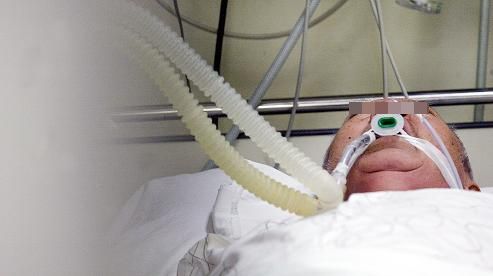 |
|
A patient undergoing life-sustaining treatment
|
Additional right of consent extended from patients to family members
The forms of life-sustaining treatments that patients or their family members are allowed to decline or discontinue in the terminal stages of life will be expanded as of Mar. 28 to include vasopressor agents and extracorporeal life support. Discontinuation of life-sustaining treatment will also be allowed with the consent of the patient’s family members – excluding those whose whereabouts are unknown – rather than by the patient’s doctor only, with relaxed conditions for family members who cannot be contacted to provide their consent. The term “life-sustaining treatment” refers to medical procedures without healing effects that are performed on terminal-stage patients whose conditions are no longer treatable by modern medicine; their sole aim is to prolong the patient’s life. The new measures expand the scope of procedures, which currently include cardiopulmonary resuscitation, respirator use, hemodialysis, and the administration of anti-cancer agents. The Ministry of Health and Welfare (MOHW) announced on Mar. 19 that a partial amendment of the enforcement decree of the Act on Hospice and Palliative Care and Decisions on Life-Sustaining Treatment for Patients at the End of Life, which increases the varieties of medical procedures considered to constitute life-sustaining treatment, was approved by the Cabinet and will enter effect as of Mar. 28. The enforcement decree’s amendment follows last year’s amendment of the act in question to expand the scope of life-sustaining treatments to guarantee patients a broader right to self-determination. According to the amendment, the range of procedures constituting life-sustaining treatment will be expanded as of Mar. 28 from their current four types (including cardiopulmonary resuscitation, or CPR) to include extracorporeal life support, blood transfusions and vasopressor agents. Also included in the life-sustaining treatment category are procedures that the attending physician determines can be discontinued or deferred. “Extracorporeal life support” refers to the use of an extracorporeal membrane oxygenation (ECMO) device to maintain a patient’s lost cardiopulmonary functions. Permission has now been granted to discontinue treatment in cases where heart and lung function are irretrievably lost and various organs are failing to function, with the procedure merely prolonging the patient’s terminal stage. Transfusions are not considered helpful for treatment when the cause of blood loss cannot be precisely corrected, while vasopressor agents were included in the category of life-sustaining treatment not only because they prolong a patient’s life when administered under conditions where recovery is not possible, but also because they may cause side effects by killing and decaying limb tissue. With the additional inclusion of procedures that can be discontinued or deferred based on the attending physician’s determination, the amendment establishes a basis for determining various medical procedures to constitute life-sustaining treatment. The amendment also loosens conditions for family members making determinations on whether to discontinue a patient’s life-sustaining treatment. Decisions on whether to discontinue or defer life-sustaining treatment are made according to an advance directive drafted by the patient or, in the terminal stage, by a combination of the patient’s determination and consistent statements from two or more family members or by the agreement of all members of the patient’s family. In some cases, the positions of all family members cannot be determined when deciding whether to discontinue life-sustaining treatment because a member’s whereabouts are unknown; the amendment lowers the required period elapsed from the date a family member was reported missing from “three or more years” to “one year or longer” for exclusion from agreements to be made by all family members. “Through this enforcement decree amendment, we will work to ensure that more South Koreans are able to reach the end of their lives in a dignified and comfortable manner through life-sustaining treatment decisions,” said Ha Tae-gil, director the MOHW bioethics policy division. By Kim Yang-joong, medical correspondent Please direct comments or questions to [english@hani.co.kr]






